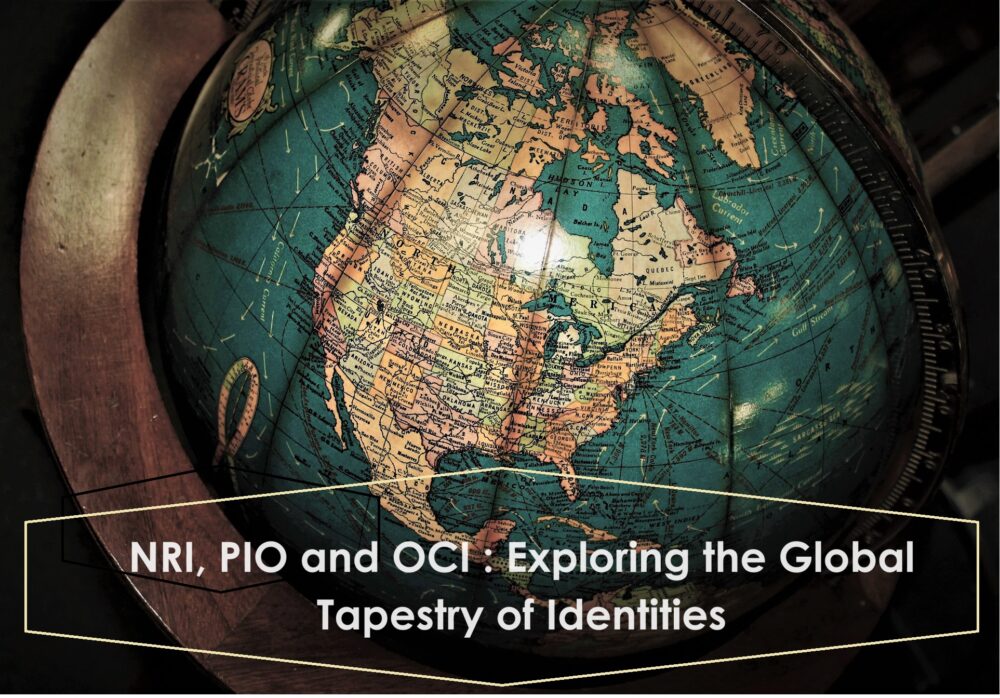
NRI, PIO and OCI: Exploring the Global Tapestry of Identities
Author: Overseas Indian Desk, at ZEUS Law
The Indian diaspora has expanded significantly, offering opportunities for individuals of Indian descent living abroad to maintain connections with their homeland, including categories such as Non-Resident Indians (NRI’s), Person(s) of Indian Origin (PIO’s) and Overseas Citizens of India (OCI’s).
The Indian Citizenship Act, 1955 does not allow dual citizenship -i.e., an Indian Citizen cannot hold the citizenship of any other country at the same time. Article 5 of the Constitution of India states that a person is a citizen of India if they:
- Were born in India
- Either of their parents were born in India
- Have been ordinarily resident in the territory of India for at least 5 years immediately before the commencement of the Constitution
Decoding the NRI Phenomenon
An Indian passport is a government-issued document that serves as proof of Indian citizenship. It verifies the holder’s identity and nationality, allowing them to enter and exit foreign countries. A Non-Resident Indian is someone of Indian origin, who is residing in a foreign country and holds an Indian passport. The two main acts that govern and prescribe the rules for NRIs are the Income Tax Act, 1961 (governs tax liability of NRIs) and the Foreign Exchange Management Act, 1999 (governs all transactions and investments, the opening of bank accounts, etc., of NRIs).
While Section 6 of the Income Tax Act, 1961 has no definition of who qualifies as an NRI, it does outline the criteria for an individual to qualify as a resident of India. A person who:
- has been in India for 182 days or more during the previous year (i.e. financial year gone by), or
- has been in India for 60 days or more in the previous financial year, in addition to having lived there for 365 days or more in the 4 years immediately preceding the said financial year.
Any Indian Citizen who does not meet the criteria stated above, ceases to be a Resident of India and may fall within the ambit of an NRI.
Unlocking the essence of OCIs
A person’s nationality is their place of birth and their sense of belonging to a country. Citizenship is a political status awarded by a country’s government to an individual who meets the legal requirements.
An Overseas Citizen of India is a foreign national of Indian origin who holds a foreign passport and is not a citizen of India, but gets registered as an OCI Cardholder under Section 7A of The Citizenship Act, 1955. The OCI card is only valid with a valid and existing foreign passport. The OCI scheme was introduced by The Citizenship (Amendment) Act, 2005 in response to demands for dual citizenship by the Indian diaspora. As of 2020, there are 6 million holders of OCI cards among the Indian Overseas diaspora.
As per the Consulate General of India, a foreign national, who was eligible to become a citizen of India on January 26, 1950 or was a citizen of India on or at any time after January 26, 1950, or belonged to a territory that became part of India after August 15, 1947 and his/her children and grandchildren, is eligible for registration as an OCI. Thus, an OCI Cardholder is not a citizen of India but someone with the liberty to reside and work within the boundaries of India.
Demystifying the PIO Status
A Person of Indian Origin (PIO) means a citizen of any country, other than Bangladesh or Pakistan, who had:
- at any time held an Indian passport or;
- he or either of his parents or any of his grandparents was a citizen of India by virtue of The Constitution of India or The Citizenship Act, 1955 or;
the person is a spouse of an Indian citizen or a person referred to in (a) or (b).
****
Thank you for reading! We hope you find the newsletter informative and insightful. For any queries, concerns or assistance, please feel free to reach out to us at [email protected]






















